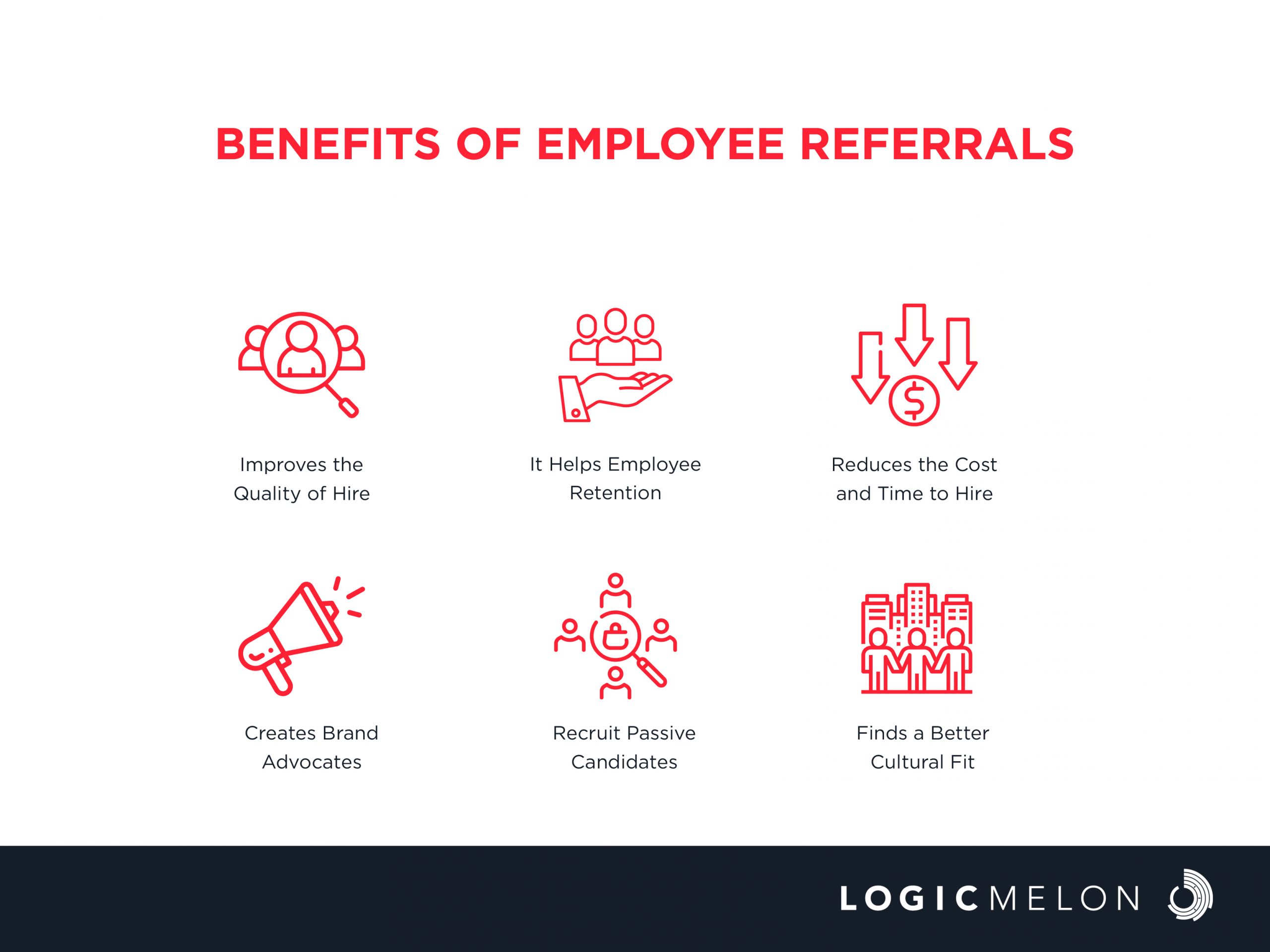Employee Referral: A Complete Guide
When it comes to recruitment, you can always use help with finding a suitable candidate for your organisation. Employee referrals can help you find the right candidate while reducing the cost and the time it takes to hire through any other method.
To keep your business floating, you need to have a talented workforce that will help you with the growth of your company. But how do you find suitable candidates? It should not be surprising that traditional recruitment techniques can only go so far.
To stay ahead of your competitors, you need to proactively work on your recruitment and use all the sources you have at your disposal to recruit candidates. Employee referral is a method that helps you find the candidates who make the right fit for your organisation.
What Is an Employee Referral?
An employee referral is a recruitment strategy where the existing employees recommend a candidate from their network for the organisation.
The employee usually submits the resume or passes the candidate information to the recruitment team. Recruiters then contact the candidate, screen them, and check if they are suitable for the company and the role.
What Is an Employee Referral Program?
An employee referral program is a formal way for the employees to submit resumes, as well as raise and announce job openings. Employees can recommend candidates even when there are no referral programs in place.
An organised program to help with employee referrals makes it easier for you to rely on them in your recruitment efforts.
Also, an employee referral program makes tracking the candidates you receive through referrals easier. The program can also motivate employees with rewards and benefits for a successful referral.
Benefits of Employee Referrals
The main reason employee referrals are desirable as a recruitment strategy is because of the benefits it offers. The following are some of the benefits of successfully implementing an employee referral program:

Improves the Quality of Hire
The employees in your organisation already have an existing knowledge of the company culture and the expectations of an employee. This will make them refer only to suitable candidates for your organisation.
This w ensures that the candidates coming to your workforce have already been screened by your employees and thus are a good match for your open roles.
It Helps Employee Retention
Employee retention has always been a problem for businesses. Companies must address that to have a workforce that can handle any task, Or they run the risk of being understaffed.
An employee referral program can help you find candidates faster, and at the same time, the employees who are rewarded for their efforts can feel motivated. This improves your work culture and can have a positive impact.
Reduces the Cost and Time to Hire
As mentioned, employees screen the candidates before recommending them and only recommend the candidates they feel are a perfect match for the company. This reduces the time it takes to hire a candidate.
Cost to Hire and Time to Hire are important recruitment KPIs that are usually considered when measuring recruitment efforts. Employee referral reduces the time in sourcing the candidates and hiring time since it saves time on posting job adverts and the application process.
Creates Brand Advocates
When your employees look for new candidates, they speak about the company and the vision and mission you have in place. Even if the candidate they refer does not make it to the company, they still have a positive image of your organisation as long as they have a good candidate experience.
The employees who act as brand advocates positively highlight your company, which helps you build your brand.
Recruit Passive Candidates
Passive candidates are someone who is currently looking for a job. Sourcing such candidates is generally a time-consuming task. When you use employee referrals, you get access to their network, including their friends and families.
This can help you expand your search and recruit more passive candidates. These candidates are already working in a job and possess the necessary skills to get the job done.
Finds a Better Cultural Fit
Recruiting a candidate with the relevant skill set for the role is essential. It is also important to recruit candidates who fit culturally. Company culture directly contributes to employee engagement.
The employees who refer candidates also consider this before recommending a candidate for the organisation. This can improve your company culture, and the workforce can work towards the organisation’s goals.
Steps to Build an Employee Referral Program
An employee referral program should work well with the existing recruitment strategies. The following are the steps to build an employee referral program:
Decide When to Ask for Referrals
First and foremost, you need to decide when to depend on the employee referral program. This might vary based on various factors: an employee might have a network that would make it easier to source candidates, fill open positions using traditional sourcing methods, and have requirements that are specific and make it challenging to find candidates.
Certain times, you might want to fill the role quicker. This means you must use all the methods you have to find candidates for the position.
The most important aspect of the employee referral program is that you should not use it as the only way to find candidates. You must use employee referrals, as well as regular recruitment strategies to find candidates effectively.
Communicate with Your Employees
Once you have laid out when you’d use the employee referral program, the next step is to communicate with your employees about the recruitment requirements.
For instance, employees should know how to recommend someone for the referral program, the current openings in your company, and the requirements of the openings. If you want a proactive hiring method, you need to mention your open roles ahead of time. This will make them start looking for suitable candidates in their network.
When you have an employee referral program, ensure that your employees understand how to use those facilities. Also, always give them a complete candidate profile, so there is a lower chance of finding unqualified candidates.
For a successful employee referral program, you must communicate effectively with your employees.
Make Use of Employee Rewards and Recognition
Reward your employees when they find a successful candidate for your organisation. This acts as a motivating factor for your employees to find suitable candidates.
Usually, for every successful referral, companies offer their employees certain rewards and benefits. It could range from a small bonus to paid time off.
If you have a bonus system for your employee referrals, it is necessary to ensure that employees understand how the bonus system works. Announce this to your employees to avoid confusion later.
Keep Track of the Employee Referrals
To ensure that the program keeps going and gets the maximum out of this program, you need to track the metrics related to your employee referral program. You need to track specific metrics to find out the weak spots of your program.
Look out for the referrals to hire ratio. This can give you an idea of the number of employees you have engaged with and the number of referrals your employees have made. This shows the quality of the candidates the employees refer to.
If more referrals are rejected, the employees do not clearly understand the open roles’ requirements.
It is also necessary to look into specific roles where you can source good candidates through referrals. Making a note of this information can help you develop strategies to handle similar or different roles from the same department.
Also, keep track of the employee turnover rate through referrals and other recruitment methods. Notice any patterns and find the reasons for the turnover with the referred candidates. This can be helpful when you need a candidate.
Closing Thoughts
An employee referral system can help you with your recruitment efforts when implemented correctly. To ensure that you develop strategies that work alongside your existing recruitment efforts, try to understand more about the roles you are hiring for, and seek help from your employees when needed.
LogicMelon
Award-winning recruitment software that will find, attract, hire and analyse the way you want to work. At LogicMelon, we have experienced software recruitment marketing specialists to help you build effective recruitment solutions supported by the best customer service you’ll find anywhere!
Email: sales@logicmelon.com or call LogicMelon (UK) +44 (0) 203 553 3667 (USA) +1 860 269 3089
Recruitment Data Visualisation: Everything You Must Know
As a recruiter, you go through a lot of information daily. Recruitment data visualisation simplifies the complex data, making it easier to understand and act upon.
The Role of Soft Skills in Leadership Recruitment
In leadership development, soft skills are essential for identifying individuals who can not only manage but also inspire and guide teams to success.
ATS and CRM in Talent Acquisition
By utilising the strengths of ATS and CRM, organisations can create a comprehensive talent acquisition strategy that combines relationship building with an efficient hiring process.


